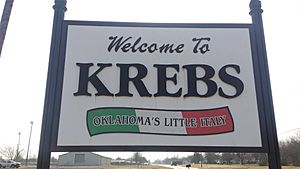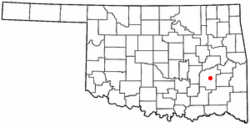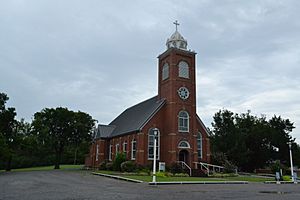Krebs, Oklahoma facts for kids
Quick facts for kids
Krebs, Oklahoma
|
|
|---|---|

Welcome sign
|
|
| Nickname(s):
Little Italy
|
|

Location of Krebs, Oklahoma
|
|
| Country | United States |
| State | Oklahoma |
| County | Pittsburg |
| Government | |
| • Type | Mayor-council |
| Area | |
| • Total | 4.85 sq mi (12.57 km2) |
| • Land | 4.84 sq mi (12.55 km2) |
| • Water | 0.01 sq mi (0.02 km2) |
| Elevation | 663 ft (202 m) |
| Population
(2020)
|
|
| • Total | 2,083 |
| • Density | 429.93/sq mi (166.00/km2) |
| Time zone | UTC-6 (Central (CST)) |
| • Summer (DST) | UTC-5 (CDT) |
| ZIP code |
74554
|
| Area code(s) | 539/918 |
| FIPS code | 40-40300 |
| GNIS feature ID | 2411559 |
| Website | http://cityofkrebs.com/home |
Krebs is a city in Pittsburg County, Oklahoma, in the United States. In 2020, about 2,083 people lived there. The city is often called "Little Italy" because of its strong Italian heritage. Krebs started as a coal-mining town before Oklahoma became a state. It was part of the Choctaw Nation in what was then called Indian Territory.
Contents
History of Krebs

Krebs began as a place where coal miners lived. Many of these miners were immigrants from Europe. A post office opened in Krebs, Indian Territory, on February 10, 1886. At that time, Krebs was in Tobucksy County, which was part of the Choctaw Nation.
The town is named after Judge Edmond Folsom Krebs. He was a county judge in Tobucksy County. Judge Krebs was born in Mississippi and had both German and Choctaw family roots.
Mining in Early Krebs
Coal mining was very important to Krebs. On January 7, 1892, there was an explosion in the Osage Coal & Mining Company’s No. 11 mine. About 100 workers died, and 150 more were hurt. Even after this sad event, mining continued to grow. By 1895, there were 15 mines working nearby.
In 1898, the first local group of the United Mine Workers was started in Krebs. This was the first time such a group formed in Indian Territory.
Town Growth and Development
Krebs officially became a town in the Choctaw Nation in 1903. Mel D. Reed was elected as the first mayor. Bob Miller became the first chief of police.
The current St. Joseph's Catholic Church was built in 1903. It was one of the first two brick buildings in town, along with an opera house. The earlier wooden church and opera house had both burned down.
The Krebs school system began in 1907. This was the same year that Oklahoma became a state. The governments of the Choctaw Nation and Indian Territory were replaced by the new state government.
Railroads and Transportation
Railroads were key for connecting Krebs to other towns. The Missouri–Kansas–Texas Railroad (called the "Katy") built a line from McAlester to Wilburton. A small train nicknamed "Nellie" ran on this line. The Katy station was in downtown Krebs.
Later, another station was built south of town. This station served the Chicago, Rock Island & Pacific Railroad (known as the "Rock Island"). For a while, an electric interurban train also ran from McAlester through Krebs to Hartshorne.
Krebs also had several newspapers over the years. These included the Krebs Eagle, Krebs Cyclone, Krebs Banner, Krebs Advertiser, and The Oklahoma Miner.
Geography of Krebs
Krebs is located about 3 miles (4.8 km) east of McAlester. McAlester is the county seat of Pittsburg County. Krebs is situated along U.S. Route 270 and State Highway 31.
The city covers a total area of about 3.4 square miles (8.8 km²). Most of this area is land, with a very small amount of water.
Notable Places in Krebs
Krebs has several interesting historical and community spots.
Krebs Opera House
The Krebs Opera House was rebuilt with bricks in 1903. This happened after the first wooden opera house burned down in 1902. It was one of the first brick buildings in Krebs, along with St. Joseph's Catholic Church. The Opera House was a special place for miles around. It hosted many stage shows and later showed movies. The Dreamland Theater eventually became the main movie theater in Krebs.
St. Joseph's Catholic Church
The original wooden St. Joseph's Church also burned in 1902. It was replaced by a brick church in 1903. This church has been fully updated in recent years.
Terrapin Derby
The Terrapin Derby was a unique event that started in Krebs in 1929. Mayor J.T. Sadler got the idea from a show he visited. The derby was a way to raise money for the city. It was very successful, helping to buy a new truck for the city. Over the years, the derby helped fund vehicles and equipment for the volunteer fire department.
Italian Band and City Park
Krebs had an Italian Band that played music in a special two-story bandstand downtown. There were several bandstands between McAlester and Hartshorne. The band played at these spots on weekends, offering entertainment for families. Many families would ride the street car to these places for picnics and festivals.
Today, the city of Krebs has a city park. This park includes a baseball field and a walking track. It also has picnic areas and a replica of the old gazebo that was once in the town square. The park is on part of what used to be a fairground and racetrack a hundred years ago. The old racetrack was a small, banked oval track where horses, sulkys, and early cars raced. The Krebs Italian Band played at many festivals, or 'festas', at the park in the past. For many years in the 1990s, "The Ethnic Festival" was a popular event held at this historic site on Labor Day weekend. People played games like bocce ball and morra for fun.
Population in Krebs
| Historical population | |||
|---|---|---|---|
| Census | Pop. | %± | |
| 1910 | 2,884 | — | |
| 1920 | 2,078 | −27.9% | |
| 1930 | 1,375 | −33.8% | |
| 1940 | 1,436 | 4.4% | |
| 1950 | 1,532 | 6.7% | |
| 1960 | 1,342 | −12.4% | |
| 1970 | 1,515 | 12.9% | |
| 1980 | 1,754 | 15.8% | |
| 1990 | 1,955 | 11.5% | |
| 2000 | 2,051 | 4.9% | |
| 2010 | 2,053 | 0.1% | |
| 2020 | 2,083 | 1.5% | |
| U.S. Decennial Census | |||
According to the 2020 census, the population of Krebs was 2,083 people. This was a small increase from the 2,053 people counted in the 2010 census.
See also
 In Spanish: Krebs (Oklahoma) para niños
In Spanish: Krebs (Oklahoma) para niños
 | Leon Lynch |
 | Milton P. Webster |
 | Ferdinand Smith |

